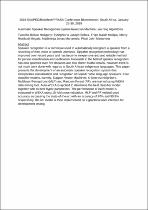JavaScript is disabled for your browser. Some features of this site may not work without it.
- ResearchSpace
- →
- Research Publications/Outputs
- →
- Conference Publications
- →
- View Item
| dc.contributor.author |
Mokgonyane, TB

|
|
| dc.contributor.author |
Sefara, Tshephisho J

|
|
| dc.contributor.author |
Modipa, Thipe I

|
|
| dc.contributor.author |
Mogale, MM

|
|
| dc.contributor.author |
Manamela, MJ

|
|
| dc.contributor.author |
Manamela, PJ

|
|
| dc.date.accessioned | 2019-09-25T06:46:09Z | |
| dc.date.available | 2019-09-25T06:46:09Z | |
| dc.date.issued | 2019-01 | |
| dc.identifier.citation | Mokgonyane, T.B., Sefara, T.J., Modipa, T.I., Mogale, M.M., Manamela, M.J. and Manamela, P.J. 2019. Automatic speaker recognition system based on machine learning algorithms, SAUPEC/RobMech/PRASA Conference Bloemfontein, South Africa, 28-30 January 2019. | en_US |
| dc.identifier.isbn | 978-1-7281-0369-3 | |
| dc.identifier.isbn | 978-1-7281-0370-9 | |
| dc.identifier.uri | https://ieeexplore.ieee.org/abstract/document/8704837 | |
| dc.identifier.uri | https://www.saiee.org.za/News/DisplayNewsItem.aspx?niid=51128 | |
| dc.identifier.uri | DOI: 10.1109/RoboMech.2019.8704837 | |
| dc.identifier.uri | http://hdl.handle.net/10204/11123 | |
| dc.description | Copyright: 2019 IEEE. Due to copyright restrictions, the attached PDF file only contains the abstract of the full text item. For access to the full text item, kindly consult the publisher's website. | en_US |
| dc.description.abstract | Speaker recognition is a technique used to automatically recognize a speaker from a recording of their voice or speech utterance. Speaker recognition technology has improved over recent years and has become inexpensive and and reliable method for person identification and verification. Research in the field of speaker recognition has now spanned over five decades and has shown fruitful results, however there is not much work done with regards to South African indigenous languages. This paper presents the development of an automatic speaker recognition system that incorporates classification and recognition of Sepedi home language speakers. Four classifier models, namely, Support Vector Machines, K-Nearest Neighbors, Multilayer Perceptrons (MLP) and Random Forest (RF), are trained using WEKA data mining tool. Auto-WEKA is applied to determine the best classifier model together with its best hyper-parameters. The performance of each model is evaluated in WEKA using 10-fold cross validation. MLP and RF yielded good accuracy surpassing the state-of-the-art with an accuracy of 97% and 99.9% respectively, the RF model is then implemented on a graphical user interface for development testing. Index Terms—Speaker recognition, text-independent, support vector machine, k-nearest neighbors, multilayer-perceptron, auto-weka, random forest. | en_US |
| dc.language.iso | en | en_US |
| dc.publisher | IEEE | en_US |
| dc.relation.ispartofseries | Worklist;22641 | |
| dc.subject | Speaker recognition | en_US |
| dc.subject | Support vector machines | en_US |
| dc.subject | K-Nearest neighbors | en_US |
| dc.subject | Multilayer perceptrons | en_US |
| dc.subject | Random forest | en_US |
| dc.title | Automatic speaker recognition system based on machine learning algorithms | en_US |
| dc.type | Conference Presentation | en_US |
| dc.identifier.apacitation | Mokgonyane, T., Sefara, T. J., Modipa, T. I., Mogale, M., Manamela, M., & Manamela, P. (2019). Automatic speaker recognition system based on machine learning algorithms. IEEE. http://hdl.handle.net/10204/11123 | en_ZA |
| dc.identifier.chicagocitation | Mokgonyane, TB, Tshephisho J Sefara, Thipe I Modipa, MM Mogale, MJ Manamela, and PJ Manamela. "Automatic speaker recognition system based on machine learning algorithms." (2019): http://hdl.handle.net/10204/11123 | en_ZA |
| dc.identifier.vancouvercitation | Mokgonyane T, Sefara TJ, Modipa TI, Mogale M, Manamela M, Manamela P, Automatic speaker recognition system based on machine learning algorithms; IEEE; 2019. http://hdl.handle.net/10204/11123 . | en_ZA |
| dc.identifier.ris | TY - Conference Presentation AU - Mokgonyane, TB AU - Sefara, Tshephisho J AU - Modipa, Thipe I AU - Mogale, MM AU - Manamela, MJ AU - Manamela, PJ AB - Speaker recognition is a technique used to automatically recognize a speaker from a recording of their voice or speech utterance. Speaker recognition technology has improved over recent years and has become inexpensive and and reliable method for person identification and verification. Research in the field of speaker recognition has now spanned over five decades and has shown fruitful results, however there is not much work done with regards to South African indigenous languages. This paper presents the development of an automatic speaker recognition system that incorporates classification and recognition of Sepedi home language speakers. Four classifier models, namely, Support Vector Machines, K-Nearest Neighbors, Multilayer Perceptrons (MLP) and Random Forest (RF), are trained using WEKA data mining tool. Auto-WEKA is applied to determine the best classifier model together with its best hyper-parameters. The performance of each model is evaluated in WEKA using 10-fold cross validation. MLP and RF yielded good accuracy surpassing the state-of-the-art with an accuracy of 97% and 99.9% respectively, the RF model is then implemented on a graphical user interface for development testing. Index Terms—Speaker recognition, text-independent, support vector machine, k-nearest neighbors, multilayer-perceptron, auto-weka, random forest. DA - 2019-01 DB - ResearchSpace DP - CSIR KW - Speaker recognition KW - Support vector machines KW - K-Nearest neighbors KW - Multilayer perceptrons KW - Random forest LK - https://researchspace.csir.co.za PY - 2019 SM - 978-1-7281-0369-3 SM - 978-1-7281-0370-9 T1 - Automatic speaker recognition system based on machine learning algorithms TI - Automatic speaker recognition system based on machine learning algorithms UR - http://hdl.handle.net/10204/11123 ER - | en_ZA |






